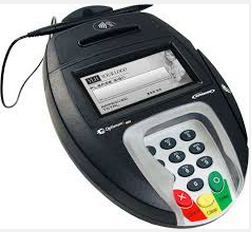Last week, several thousand credit card payment terminals at various
retailers across the country suddenly stopped working, their LCD
displays showing blank screens instead of numbers and letters. Puzzled
merchants began to worry that this was perhaps part of some
sophisticated hacker attack on their cash registers. It turns out that
the incident was indeed security-related, but for once it had nothing to
do with cyber thieves.
On Dec. 7, 2014, certain older model payment terminals made by Hypercom stopped working due to the expiration of a cryptographic certificate used in the devices, according to Scottsdale, Ariz.-based Equinox Payments, the company that owns the Hypercom brand.
“The security mechanism was triggered by the rollover of the date and not by any attack on or breach of the terminal,” said Stuart Taylor, vice president of payment solutions at Equinox. “The certificate was created in 2004 with a 10 year expiry date.”
Taylor said Equinox is now working with customers, distributors and
channel partners to replace the certificate to return terminals to an
operational state. The company is pointing affected customers who still
need assistance to this certificate expiry help page.
“Many of these terminals have been successfully updated in the
field,” Taylor said. “Unfortunately, a subset of them can’t be fixed in
the field which means they’ll need to be sent to our repair facility.
We are working with our customers and distribution partners to track
down where these terminals are and will provide whatever assistance we
can to minimize any disruption as a result of this matter.”
According to two different merchants impacted by the incident that
reached out to KrebsOnSecurity, the bricking of these payment terminals
occurs only after the affected devices (in the 4x version of the
terminals) are power-cycled or rebooted, which some merchants do daily.
Michael Rochette, vice president at Spencer Technologies,
a Northborough, Mass.-based technology installation and support
company, said his firm heard last week from an East Coast supermarket
chain that opened for business on Monday morning only to find all of
their payment terminals unresponsive. Rochette said that the supermarket
chain and other retailers impacted by the incident across the country
were immediately worried that the incident was part of a hacker attack
on their payment infrastructure.
“Not all stores power cycle overnight, but for those that do, they
came up all blank and inoperative,” Rochette said. “If that’s something
that a retail chain does as a matter of policy across a whole chain of
stores, that can be pretty damaging.”
One retailer that contacted KrebsOnSecurity but asked to remain
anonymous said technicians at its locations had spent three days trying
without success to restore the devices.
“I use two different generations of their terminals and have spent
the last three days trying to understand completely why I had zero
impact,” a reader from the retailer said. “Mass extinction of my POS
devices at the manufacturer level was never on my list of scenarios that
would wreck my day at retail. It is now.”
While designing your products so that they fail after 10 years seems
like a less than brilliant idea, this incident is a reminder of just how
much of the payments infrastructure in the United States relies on
rapidly aging technology.
According to Rochette, at least one of the affected Hypercom devices
is no longer allowed to be used in retail installations after 2014, per
sunset provisions set out by the PCI Council, an industry group that
sets security standards for payment systems. Other Hypercom models
affected by this incident are perfectly acceptable to use for years to
come.
As for why Equinox failed to warn its customers of the impending
meltdown of these payment terminals? Rochette posits that it might have
something to do with Hypercom’s rocky corporate history.
“I’ve never seen this before where a particular product all crashed
on the same day, and as far as I can tell there was no advance warning
about this from Equinox,” Rochette said. “Over the last few years, they
were Hypercom, then part of Equinox, then part of Verifone for a while,
so I suspect there’s been a lot of turnover in personnel there, and
frankly they just lost sight of the fact that they had a pretty
important expiration date coming.”

No comments:
Post a Comment